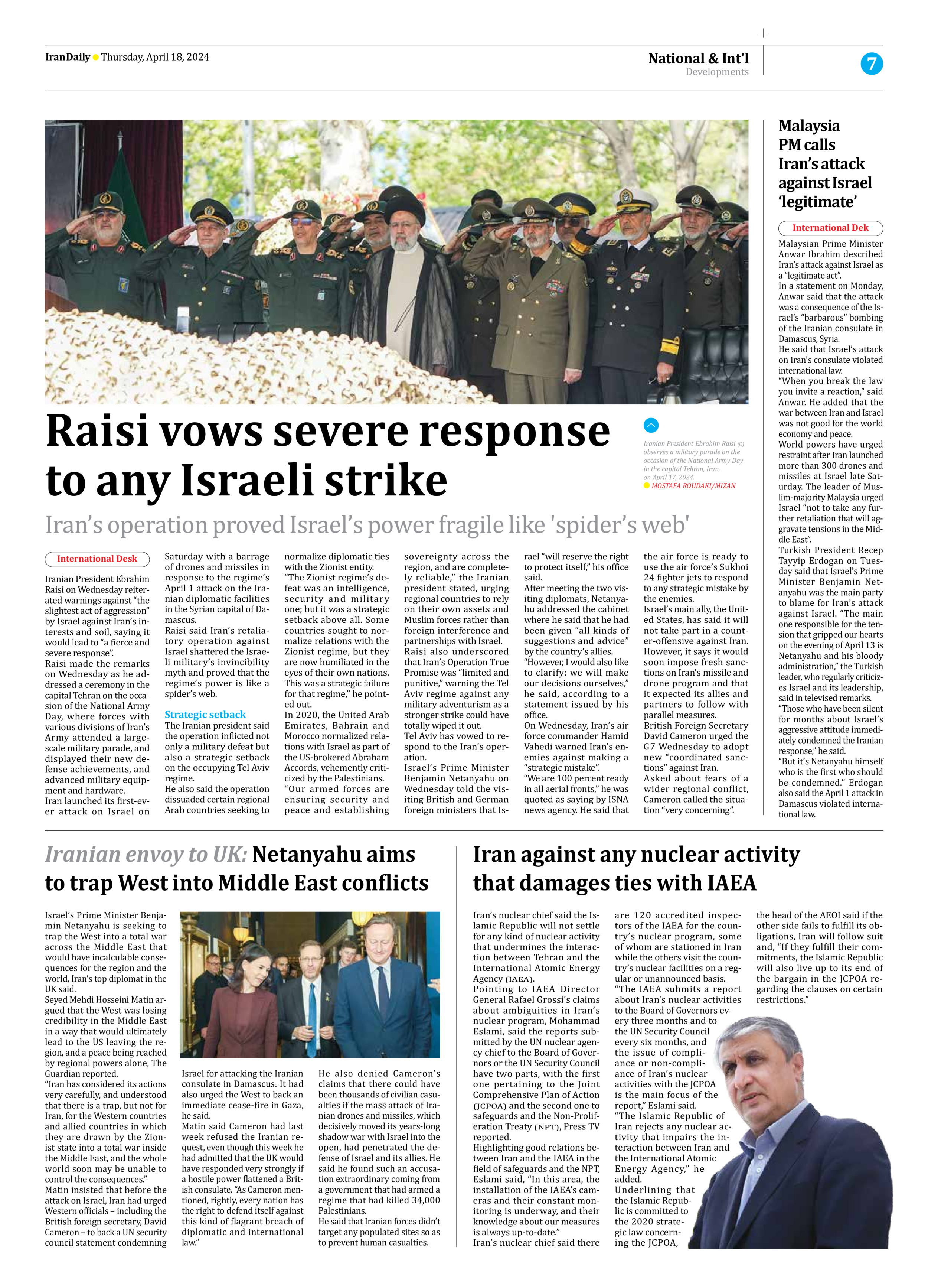
Raisi vows severe response to any Israeli strike
Iran’s operation proved Israel’s power fragile like ’spider’s web’
Iranian President Ebrahim Raisi on Wednesday reiterated warnings against “the slightest act of aggression” by Israel against Iran’s interests and soil, saying it would lead to “a fierce and severe response”.
Raisi made the remarks on Wednesday as he addressed a ceremony in the capital Tehran on the occasion of the National Army Day, where forces with various divisions of Iran’s Army attended a large-scale military parade, and displayed their new defense achievements, and advanced military equipment and hardware.
Iran launched its first-ever attack on Israel on Saturday with a barrage of drones and missiles in response to the regime’s April 1 attack on the Iranian diplomatic facilities in the Syrian capital of Damascus.
Raisi said Iran’s retaliatory operation against Israel shattered the Israeli military’s invincibility myth and proved that the regime’s power is like a spider’s web.
Strategic setback
The Iranian president said the operation inflicted not only a military defeat but also a strategic setback on the occupying Tel Aviv regime.
He also said the operation dissuaded certain regional Arab countries seeking to normalize diplomatic ties with the Zionist entity.
“The Zionist regime’s defeat was an intelligence, security and military one; but it was a strategic setback above all. Some countries sought to normalize relations with the Zionist regime, but they are now humiliated in the eyes of their own nations. This was a strategic failure for that regime,” he pointed out.
In 2020, the United Arab Emirates, Bahrain and Morocco normalized relations with Israel as part of the US-brokered Abraham Accords, vehemently criticized by the Palestinians.
“Our armed forces are ensuring security and peace and establishing sovereignty across the region, and are completely reliable,” the Iranian president stated, urging regional countries to rely on their own assets and Muslim forces rather than foreign interference and partnerships with Israel.
Raisi also underscored that Iran’s Operation True Promise was “limited and punitive,” warning the Tel Aviv regime against any military adventurism as a stronger strike could have totally wiped it out.
Tel Aviv has vowed to respond to the Iran’s operation.
Israel’s Prime Minister Benjamin Netanyahu on Wednesday told the visiting British and German foreign ministers that Israel “will reserve the right to protect itself,” his office said.
After meeting the two visiting diplomats, Netanyahu addressed the cabinet where he said that he had been given “all kinds of suggestions and advice” by the country’s allies.
“However, I would also like to clarify: we will make our decisions ourselves,” he said, according to a statement issued by his office.
On Wednesday, Iran’s air force commander Hamid Vahedi warned Iran’s enemies against making a “strategic mistake”.
“We are 100 percent ready in all aerial fronts,” he was quoted as saying by ISNA news agency. He said that the air force is ready to use the air force’s Sukhoi 24 fighter jets to respond to any strategic mistake by the enemies.
Israel’s main ally, the United States, has said it will not take part in a counter-offensive against Iran. However, it says it would soon impose fresh sanctions on Iran’s missile and drone program and that it expected its allies and partners to follow with parallel measures.
British Foreign Secretary David Cameron urged the G7 Wednesday to adopt new “coordinated sanctions” against Iran.
Asked about fears of a wider regional conflict, Cameron called the situation “very concerning”.







